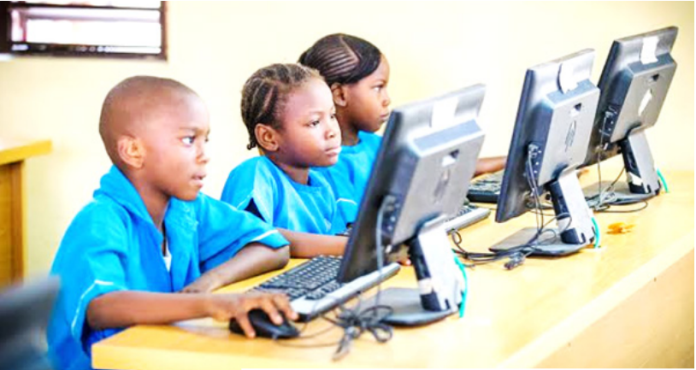Whether people like it or not, the world has gone digital, and as they say, the old things are giving way to the new. In this case, the use of the computer has become the main thing, and the computer now rules the world. Anybody without computer knowledge is out of it.
With the National Policy on Education as well as the Sustainable Development Goals (SDGs), the majority of students must be computer literate within a given period or be left behind. As a result of this development, most fast-thinking Nigerians have been wondering how possible it would be to achieve in a country without the necessities to acquire computer education. How is it going to be possible in a country without the necessities, computers, teachers, instructors, electricity and other devices that would enhance the learning of computers?
As the thoughts have engaged the minds of the people, the Federal Government has just announced that it would provide 47 million computers to different schools in the country through the Universal Basic Education Commission (UBEC) to Pre-Primary, Primary and Junior Secondary Schools.
The Universal Basic Education (UBE) said the beneficiaries from the new digital learning Initiative under a public-private learning network and learning technology and finance firms will include Samsung, Huawei and Zenith Bank.
Speaking at the signing of the Memorandum of Understanding (MOU) in Abuja recently, UBEC Executive Secretary Mrs Aisha Garba said that the scheme aligned with President Tinubu’s Renewed Hope Agenda. Mrs Garba said that the project would provide laptops and devices for pupils, while teachers would also be equipped with digital tools to improve classroom delivery.
She said that special focus would be placed on remote and underserved communities, ensuring that no Nigerian Child was left behind, and this, she repeated, was in line with the President’s Agenda and the Policy on SDGs
With all these on the ground, it would appear that the Federal Government is serious about Computer Studies. But to successfully introduce computers in schools, experts said it is advised that the Federal Government should develop a comprehensive plan to outline clear timeline and budget for the initiative, train the teachers to provide educators with the necessary skills to effectively integrate computers into the teaching practices, ensure provision of infrastructure –reliable electricity and suitable learning environment, and most importantly to engage the stakeholders by way of involve the parents, teachers and the community in the planning and implementation process.
It is also worth noting that introducing computers to pre-primary schools in Nigeria requires a thoughtful approach. Experts say some of the steps to consider include developing fundamental skills (Computer literacy), having computer laboratories, and providing teachers with training and support programmes. Others are partnership, Government funding, among others.
Good as the provision of computers to schools appears, our concern and pain is the implementation, as some factors have been noted to impede its execution, like every other previous policy or project in Nigeria.
They are unstable power supply, inadequate internet connectivity, and poor maintenance of ICT facilities. Others include a lack of teachers with teaching skills, resistance to change, and the attitude of teachers and students. Also, students have limited access to computers outside the school.
Despite the pros and cons, the idea of introducing laptops to schools is a welcome development and a commendable initiative that can potentially bridge the digital divide and enhance the learning experience for students and teachers.
The key benefits, as stated above, are improved academic performance via digital literacy and increased access to education. The challenges are limited infrastructure and teacher education because it is relatively new in this part of the world.
Generally, the introduction of laptops to Nigerian students and pupils has the potential to transform the entire education sector, but it requires careful planning, implementation and sustainability to achieve its goals as stated by the stakeholders.
It is also important to ensure that the laptops get to the beneficiaries to avoid the unpalatable stories of food palliatives where the food did not get to the majority of the people.
To this end, the Federal Government and the UBEC should ensure that there is a transparent distribution process, public awareness campaigns to inform students, parents and schools about the laptops distribution programme, its objectives and the selection process. No doubt, if the idea is well managed and funded, it will bring rapid revolution in the Education Sector.
Surely, it is going to bring total revolution of a very key sector in the economy because, if the education sector is well handled and digitalised, other sectors would follow, and before one knows it, it will affect most of the people.
The Government should move fast on the policy as it would be a plus to this generation and the generation unborn. Those who have arrived there now started from somewhere. Nigeria can equally do the same.


